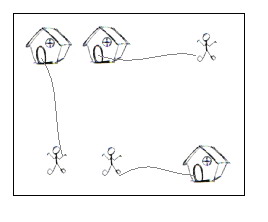POJ2195 Going Home
Posted SilverNebula
tags:
篇首语:本文由小常识网(cha138.com)小编为大家整理,主要介绍了POJ2195 Going Home相关的知识,希望对你有一定的参考价值。
| Time Limit: 1000MS | Memory Limit: 65536K | |
| Total Submissions: 22091 | Accepted: 11156 |
Description
On a grid map there are n little men and n houses. In each unit time, every little man can move one unit step, either horizontally, or vertically, to an adjacent point. For each little man, you need to pay a $1 travel fee for every step he moves, until he enters a house. The task is complicated with the restriction that each house can accommodate only one little man.
Your task is to compute the minimum amount of money you need to pay in order to send these n little men into those n different houses. The input is a map of the scenario, a ‘.‘ means an empty space, an ‘H‘ represents a house on that point, and am ‘m‘ indicates there is a little man on that point.

You can think of each point on the grid map as a quite large square, so it can hold n little men at the same time; also, it is okay if a little man steps on a grid with a house without entering that house.
Your task is to compute the minimum amount of money you need to pay in order to send these n little men into those n different houses. The input is a map of the scenario, a ‘.‘ means an empty space, an ‘H‘ represents a house on that point, and am ‘m‘ indicates there is a little man on that point.

You can think of each point on the grid map as a quite large square, so it can hold n little men at the same time; also, it is okay if a little man steps on a grid with a house without entering that house.
Input
There are one or more test cases in the input. Each case starts with a line giving two integers N and M, where N is the number of rows of the map, and M is the number of columns. The rest of the input will be N lines describing the map. You may assume both N and M are between 2 and 100, inclusive. There will be the same number of ‘H‘s and ‘m‘s on the map; and there will be at most 100 houses. Input will terminate with 0 0 for N and M.
Output
For each test case, output one line with the single integer, which is the minimum amount, in dollars, you need to pay.
Sample Input
2 2 .m H. 5 5 HH..m ..... ..... ..... mm..H 7 8 ...H.... ...H.... ...H.... mmmHmmmm ...H.... ...H.... ...H.... 0 0
Sample Output
2 10 28
Source
从每个人向每幢房子连边,边权为行走代价。之后跑最小费用最大流。
看到用最小权二分图匹配也可以解,然而并不会
1 //#include <bits/stdc++.h> 2 #include<iostream> 3 #include<cstdio> 4 #include<algorithm> 5 #include<cmath> 6 #include<queue> 7 #include<cstring> 8 using namespace std; 9 const int INF=1e8; 10 const int mxn=240; 11 int ans; 12 struct edge{ 13 int cap; 14 int f,res; 15 int v; 16 }e[mxn][mxn]; 17 struct start{ 18 int x,y; 19 }a[mxn]; 20 struct house{ 21 int x,y; 22 }h[mxn]; 23 int acnt=0,hcnt=0; 24 int n,m; 25 int S,T; 26 char mp[mxn][mxn]; 27 void init(){ 28 memset(e,0,sizeof e); 29 acnt=hcnt=0; 30 ans=0; 31 } 32 bool inq[mxn]; 33 int dis[mxn]; 34 int pre[mxn]; 35 void SPFA(int s){ 36 memset(dis,0x3f,sizeof dis); 37 memset(pre,-1,sizeof pre); 38 queue<int>q; 39 q.push(s); 40 inq[s]=1; 41 dis[s]=0; 42 while(!q.empty()){ 43 int u=q.front();q.pop();inq[u]=0; 44 for(int i=0;i<=T;i++){//v 45 int v=i; 46 if(e[u][v].res==0)continue; 47 if(e[u][v].v==INF) e[u][v].v=-e[v][u].v; 48 if(dis[v]>dis[u]+e[u][v].v){ 49 dis[v]=dis[u]+e[u][v].v; 50 pre[v]=u; 51 if(!inq[v]){ 52 inq[v]=1; 53 q.push(v); 54 } 55 } 56 } 57 } 58 return; 59 } 60 int minres=0; 61 void maxflow(int s,int t){ 62 SPFA(s); 63 while(pre[t]!=-1){ 64 ans+=dis[t]; 65 int tmp=INF; 66 int u=pre[t],v=t; 67 while(u!=-1){ 68 tmp=min(tmp,e[u][v].res); 69 v=u;u=pre[u]; 70 } 71 u=pre[t],v=t; 72 while(u!=-1){ 73 e[u][v].f+=tmp; 74 e[v][u].f-=tmp; 75 e[u][v].res-=tmp; 76 e[v][u].res+=tmp; 77 v=u;u=pre[u]; 78 } 79 SPFA(s); 80 } 81 return; 82 } 83 int main() 84 { 85 int i,j; 86 while(scanf("%d%d",&n,&m) && n && m){ 87 init(); 88 for(i=1;i<=n;i++){ 89 scanf("%s",mp[i]+1); 90 for(j=1;j<=m;j++){ 91 if(mp[i][j]==‘H‘){ 92 h[++hcnt].x=i; 93 h[hcnt].y=j; 94 } 95 if(mp[i][j]==‘m‘){ 96 a[++acnt].x=i; 97 a[acnt].y=j; 98 } 99 } 100 } 101 S=0;T=hcnt+acnt+1; 102 for(i=1;i<=T;i++) 103 for(j=1;j<=T;j++) 104 e[i][j].v=INF; 105 for(i=1;i<=acnt;i++){//人 106 e[S][i].v=0; 107 e[S][i].cap=e[S][i].res=1; 108 for(j=1;j<=hcnt;j++){//房子 109 int w=abs(h[j].x-a[i].x)+abs(h[j].y-a[i].y); 110 e[i][acnt+j].v=w; 111 e[i][acnt+j].cap=1; 112 e[i][acnt+j].res=1; 113 e[acnt+j][T].v=0; 114 e[acnt+j][T].cap=e[acnt+j][T].res=1; 115 } 116 } 117 // 118 maxflow(S,T); 119 printf("%d\n",ans); 120 } 121 return 0; 122 }
以上是关于POJ2195 Going Home的主要内容,如果未能解决你的问题,请参考以下文章